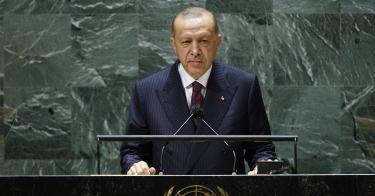Nature abhors a vacuum. So does Afghanistan.
Afghanistan is not the graveyard of empires. It is their crossroads. That remains true in this age of great power competition.
U.S. President Joe Biden’s abrupt withdrawal from the country opened the way not just for the Taliban’s return to power, but for other nations to establish their influence as well. Much attention has focused on the role that China, Iran and Russia may play. One key question, however, will be: What will Turkey do?
Turkish President Recep Tayyip Erdogan recently announced that, unlike other NATO members, Ankara will maintain its diplomatic presence in Kabul.
>>> How To Make Sure the Black Sea Doesn’t Become a Geopolitical Black Hole
Ankara is also considering a request to run the Kabul airport. Indeed, Ankara had already agreed to manage airport security before the allies’ sudden withdrawal. The airport was at the center of the first talks held between Turkey and the Taliban, four days before the last U.S. troops boarded the last plane out.
Turkish officials recently told Reuters that Ankara will not run the airport unless the Taliban consent to the presence of Turkish security forces. This condition may be hard for the Afghan regime to accept, but they likely will. If that happens the two sides will depend on each other to run the country’s chief window to the world—a risky but high-profile partnership for Ankara.
The airport looks like Turkey’s toe in Taliban waters. According to The Daily Sabah, Erdogan hopes to sign a security cooperation agreement with the Taliban similar to the one struck between Ankara and Tripoli. That agreement allowed Erdogan to take Western Libya under his military wing, dramatically increasing Turkish influence there.
“I cannot say that making an agreement like that with Libya is out of the question,” Erdogan told The Daily Sabah. “We can make a similar agreement as long as we find an interlocutor.” Clearly, the Turkish leader hopes to increase his influence in Afghanistan.
Why does Erdogan want in where Biden fears to tread?
Ankara sees influence over Afghanistan as a key factor in its political and economic expansion in Central Asia.
Erdogan may also want to stop a problem before it starts. Turkey currently hosts 3.7 million Syrian refugees. Afghan instability could create another huge migration wave. Preventing another human tsunami would make Erdogan’s life easier and earn him a lot of good will in Western Europe, which also dreads another mass refugee influx.
Turkish Foreign Minister Mevlut Cavusoglu recently stated: “As Turkey, we have sufficiently carried out our moral and humanitarian responsibilities regarding migration.” He added, “it is out of the question for us to take an additional refugee burden.”
Erdogan may also see himself serving as a mediator between NATO and the actors currently involved in the Afghan crisis. Qatar, a close ally of Ankara, is aiming for a similar role, as is the Muslim Brotherhood network, which has its own relations with all the actors involved.
Ankara’s engagement could benefit the United States. It would be good to have a NATO ally on Afghan soil who could negotiate some American interests—such as getting citizens, friends and allies out—without Washington having to engage directly with the Taliban.
Still there are real risks for both Turkey and the U.S. The new Taliban looks a lot like the old, and Ankara may find itself saddled with a pariah for a partner. Moreover, Turkey may instigate as many problems as it solves. Erdogan notoriously conducts an ambiguous foreign policy that is not always aligned with Western interests. Even as Turkey sticks with NATO, Erdogan has expanded balancing relationships with Russia and China.
China, for example, will likely want to shape and deepen Turkey’s engagement in Afghanistan to its own benefit. Beijing aims for a deep involvement in the Afghan economic reconstruction. This goal—despite past tensions due to repression in China’s Xinjiang region—has led the Chinese government to take a soft approach toward the Taliban. Turkey and China may well end up launching a sort of partnership.
>>> How A Rising China Complicates Europe’s Future
Unless the U.S. wants its bad situation in Afghanistan to get even worse, it cannot be a bystander to future developments. As Libya descended into chaos, Washington sat on the sidelines while outside powers, including Turkey, picked sides. The U.S. cannot make the same mistake in Afghanistan.
There is no question that the Taliban will be an unsuitable and feckless partner for the West, a troubling haven for transnational terrorism and a massive human-rights abuser. Normalizing and engaging the Taliban will bring only embarrassment and sorrow. On the other hand, working together, the U.S. and Turkey could achieve some positive outcomes that would mitigate the bad things coming out of Afghanistan, grow constructive relations with Central Asia, and diminish the appetite for great-power competition in Afghanistan.
What could be achieved in Turkish-U.S. cooperation would likely be modest, but helpful to both nations—especially helpful to Erdogan in mitigating his risks in Afghanistan. This is the way Ankara and Washington should have, but didn’t, partner in Libya. Can both learn from their mistakes?
This piece originally appeared in Real Clear World




